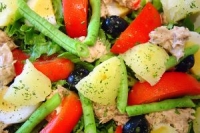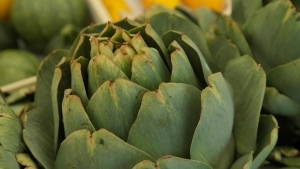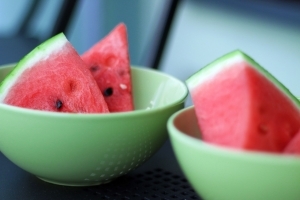Maqlubeh - 'flipped over' chicken and rice bake with Palestinian salad

Supplied Photo: Reem Kassis
Adapted from The Palestinian Table by Reem Kassis
Maqlubeh means "flipped over" and refers to the way the pot is flipped after being cooked to reveal a cake-shaped dish of rice, meat, and vegetables.
There are as many variations of maqlubeh as there are Palestinian families, and this particular one is my teta (grandmother) Fatima's. You could also use bone-in lamb cuts (preferably from the shoulder) in place of the chicken, for example.
Preparation Time: 15 minutes + soaking / Cooking Time: 2 hours
Serves: 8
Ingredients
For the rice
- 1 quantity Spiced Cooking Broth (Stock) using 4 chicken legs or 4 bone-in breasts (page 34)
- vegetable oil, for frying
- 2 eggplants (aubergines) (about 2 ¼ lb/1 kg) sliced into ¾ inch/2-cm rounds
- 1 head of cauliflower, broken into florets
- 1 tablespoon olive oil, plus extra for drizzling
- 1 lb 10 oz/750 g jasmine rice (or any other long grain rice), rinsed, soaked for 15 minutes, and drained
- 1 tablespoon turmeric
- 1 tablespoon Nine Spice Mix (page 24)
- 1 tablespoon salt, or to taste
For the chicken
- olive oil, for drizzling
- salt
- freshly ground black pepper
To serve
- 1 quantity Toasted Almonds (page 31)
- Palestinian Salad (page 104)
- yogurt
Method
Prepare the broth (stock) according to the recipe, and when done, remove the chicken pieces and place, skin side up, on an oven roasting tray. Strain the broth and reserve.
Pour enough vegetable oil into a large skillet (frying pan) to reach about 3/4 inch/2 cm up the sides. When the oil is hot, fry the eggplants (aubergines) and cauliflower until a nice golden brown all over, about 5-10 minutes, then drain on kitchen paper. For an easier but less traditional option, you could brush the vegetables with oil and broil in the oven.
Add 1 tablespoon of olive oil, the turmeric, spices, and salt to the rice and toss until fully coated. To assemble the dish, drizzle some olive oil in a large nonstick casserole to coat the bottom. Sprinkle just enough rice to cover the bottom of the pot. Arrange the fried
vegetables over the rice and top with remaining rice. If your pot is small, you may need to repeat the layers.
Place the pot over medium-high heat and ladle the fresh broth on top until it reaches approximately ¾ inch/2 cm above the rice. Set a plate on top of the rice to help maintain
the shape during cooking. Bring to a boil and cook for 15 minutes, then reduce the heat and simmer until done, about 15-20 minutes.
Remove from the heat and set aside, covered, to rest for 10-15 minutes.
Meanwhile, preheat the oven broiler (grill). Brush the chicken with olive oil and sprinkle with salt and pepper. Broil for 5-7 minutes or until the skin is a nice golden
brown color.
To Serve
Remove the lid and place a large inverted serving platter over the pot of rice. Using both hands, flip the pot over, and slowly lift it to reveal a beautiful cake-shaped rice dish. Top with the broiled chicken, sprinkle with toasted almonds and serve with Palestinian Salad and yogurt.
SPICED COOKING BROTH (STOCK)
Adapted from THE PALESTINIAN TABLE by Reem Kassis
Every couple of months, my father buys a whole lamb and spends the entire afternoon trimming and organizing the meat for different uses; my mother then boils the bones to
make a rich, spicy broth (stock), which serves as the base for many of our non-vegetarian meals. The recipe here is for chicken broth, but it can be substituted with beef or lamb. I've used a boiling chicken but you could use a chicken carcass (or lamb or beef bones without meat) and skip the searing step; if using lamb shanks, beef short ribs, or anything else where the meat will be eaten afterwards, searing it before adding the seasonings and water gives another layer of flavor. You can replace the whole spices with 2 tablespoons of Nine Spice Mix (page 24), to be added after the water has boiled and scum has been removed.
Preparation Time: 5 minutes / Cooking Time: 1 hour 30 minutes
Serves: 8½ cups (3½ pints/2 litres)
Ingredients
- 2 tablespoons olive oil
- 2-3 pieces of mastic
- 3 bay leaves
- 2 cinnamon sticks
- 10 allspice berries
- 10 black peppercorns
- 5 cloves
- 4-5 cardamom pods
- 1 stewing chicken, jointed into 8 pieces
- 1 onion
- 2 cloves garlic
- 2 tablespoons salt
Method
Heat the olive oil in a heavy stockpot over high heat. When hot, add the mastic pieces (this helps eliminate any unpleasant meat odour) and the whole spices. Add the chicken pieces, skin side down, and sear until a golden brown color, about 3 minutes each side. Add the onion and garlic and toss everything together. Add 10 cups (4¼ pints/2.5 liters) water and the salt and bring to a boil.
Boil for 5 minutes, skimming off any scum that rises to the surface, then reduce the heat to medium-low and simmer for 1-1 ½ hours, or until the chicken is cooked through but not falling apart. Take out the chicken pieces and set aside. They can either be broiled (grilled) or refrigerated to use later in salad or soup.
Allow the broth (stock) to cool slightly before straining through a fine-mesh strainer to discard the aromatics. Cool completely before storing in airtight containers.
This stock will keep for up to 4 days in the refrigerator, or can be frozen for up to 6 months.
PALESTINIAN SALAD
Adapted from THE PALESTINIAN TABLE by Reem Kassis
Palestinians know this as "finely diced or farmer's salad"; to everyone else it's Palestinian salad. In its most basic version, it is finely diced tomatoes, onions, and dried mint lightly dressed with olive oil, lemon, and salt. In other variations, however, it can also include cucumbers, bell peppers, chillies, lemons, parsley, or radishes. Mine usually includes whatever produce I have found that is most fresh, as well as a very finely diced whole lemon-a trick I learned from my motherin- law, which gives this salad a real kick. Feel free to add any other vegetables you like, as the dressing is generous and the salad is quite forgiving. It's an absolute must next to the lentil pilafs (page 164 and 167) and a wonderful accompaniment to most kafta and rice dishes.
Preparation Time: 15 minutes
Serves: 4-6
Ingredients
- 4 large or 8 small (about 2¼ lb/1 kg) tomatoes (see Note)
- 2 small cucumbers (about 7 oz/200 g)
- 2 green chillies (optional)
- 1 whole unwaxed lemon
- 1 onion or 4-6 scallions (spring onions)
- 4 tablespoons finely chopped fresh mint leaves or 1 tablespoon crushed dried mint
- 4 tablespoons olive oil
- 4 tablespoons lemon juice
- 1 teaspoon salt
Method
Chop the tomatoes into very small cubes and put into a large bowl. Dice the cucumbers into similar-sized small cubes and add to the tomatoes. If you are using a traditional large cucumber, make sure to peel and seed it first.
Seed the chillies (if you prefer even less heat, remove all the white membrane as well). Chop very finely, and add to the vegetables. Slice the lemon into thin rounds, discarding
the top and bottom rounds and any seeds as well, then chop each round into small cubes. Add to the salad. Dice the onion very finely and add to the salad. Finally throw in the chopped fresh mint leaves or dried mint.
Drizzle with olive oil and lemon juice and sprinkle with salt. Toss very lightly with a large spoon and serve immediately.
Note: Choose a very fleshy variety of tomatoes with little pulp and seeds for this salad. Beefsteak tomatoes are a good option, as are other firm heirloom varieties.


